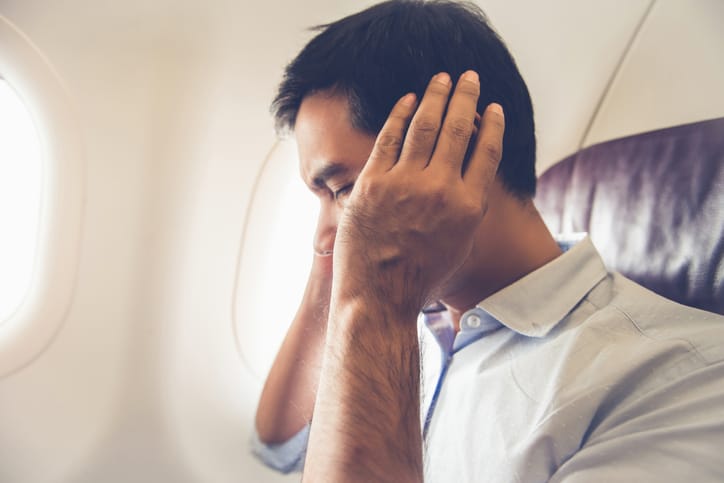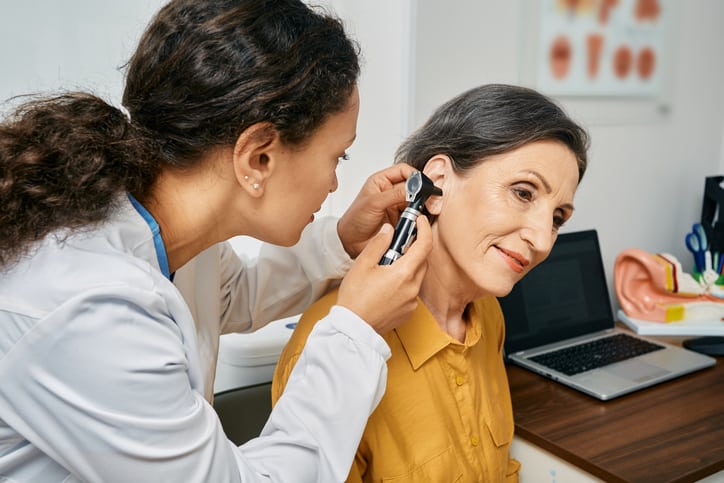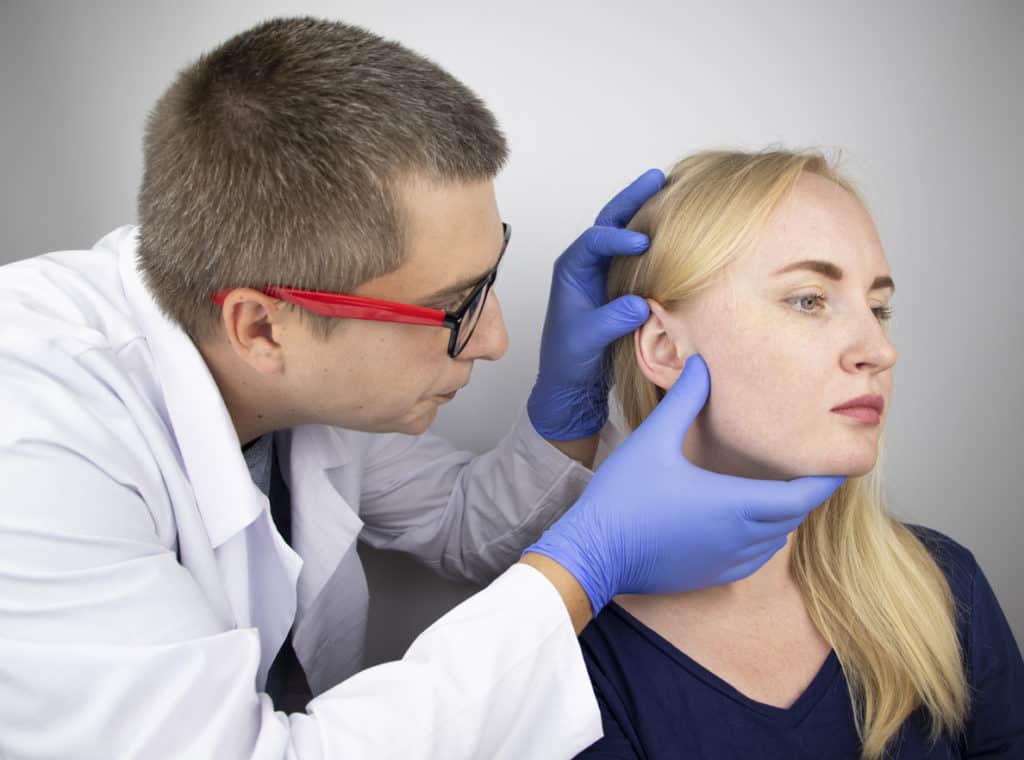It is an annoying and sometimes frightening sensation when your ears get clogged. As a result, you have muffled hearing, and your ears can feel full. The condition could be painless, brief, and resolve itself. However, if it involves other symptoms, you should see your doctor immediately.

Fluid in the ear, altitude change, foreign object blockage, and excessive ear wax can cause clogged ears. These conditions may painlessly resolve themselves. However, if accompanied by pain, tinnitus, dizziness, or hearing loss, you should consult a physician.
Want to know what causes these conditions, the symptoms, and how to treat them? Then continue reading!
The four most common reasons your ears get clogged.
Almost everyone has felt the sensation of clogged ears. Some folks, especially those that live and work at different altitudes, experience it once or twice a day. But, for most of us, the causes are temporary, painless, and minor irritations.
Changes in altitude can cause your ears to get clogged.
The reason your ears feel clogged and sometimes pop when you are flying or driving in the mountains? It’s all because of a small air pocket inside your head.
Believe it or not, your ears have popped or clicked every time you have swallowed. Every single time, since the day you were born. You don’t notice it because your brain has filtered out the noise and sensation. As a result, it got branded as fake news and censored.
Related: Why is your brain acting as a brutal dictator and censoring information a good thing? If you have tinnitus problems, read this article to find out why.
Now, that little pocket of air? Well, it gets into your middle ear by coming up the back of your nose and passing through your Eustachian Tube.
Your Eustachian Tube is a pencil-thick membraned passageway that connects the back of your nose to your middle ear. The air in your middle ear is continuously absorbed and resupplied through the Eustachian Tube’s membrane. This keeps the pressure on both sides of your eardrum equalized.
However, when the air pressure isn’t equal, your ears feel clogged.

You have undoubtedly felt this descending a mountain in a car, traveling in an elevator, or landing in a plane. These are all instances where you move quickly from a lower pressure atmosphere to higher pressure.
When your Eustachian Tube cannot open fast and wide enough to keep up with the pressure changes, it creates a problem.
How to treat ears clogged by altitude changes.
The best way to treat altitude-related clogging of the ears is to prevent it in the first place. Swallowing is nature’s way of opening and widening your Eustachian Tube. You can increase the rate of this process by yawning and chewing gum as you ascend or descend.
During commercial airplane travel, you usually are awoken if asleep and asked to return your seat to the upright position during a landing. Being awake helps you because you swallow less frequently while sleeping. In addition, you can further help prevent altitude clogging of the ears by waking a few minutes before the plane’s descent begins.
Forcefully unclogging your ears should be done with caution. Here’s an audiologist to show you how to safely do it.
Related: Trouble getting a good night’s sleep because of the ringing in your ears? Try The 15 Minute Challenge and read this article on how to get to sleep quickly.
Excessive Ear Wax leads to plugged ears.
Too much ear wax build-up can leave your ears feeling full and clogged. In addition, if the wax impacts enough on your eardrum, it can also cause tinnitus.
The ear’s natural cleaning system is enough for most people to prevent excessive wax build-up. However, some people may produce too much ear wax, which can become a problem.
Naturally produced, if excessive, ear wax doesn’t usually lead to a blockage all by itself. Instead, the jam is often caused by one of two things.
- Improper ear cleaning. Using the wrong cleaning technique can push the wax further into your ear. If you are not careful, you could rupture your eardrum by inserting a cleaning tool too deeply into it.
- Contact stimulus. Headphones, earbuds, and hearing aids that rub against the ears can cause additional ear wax production. As a defense against contact stimulus, your ears attempt to produce more was to flush out the foreign objects.
How to prevent ear wax from clogging your ears and causing tinnitus.

While there are many products on the market for cleaning your ears, like these from Amazon, you should consult with your doctor and have your ears professionally cleaned whenever you have a problem.
Related: Which doctor should you see after a tinnitus diagnosis? Read this article to find out.
How fluid in your ears can cause ear clogging and even tinnitus.
How Fluid in your Ear causes clogging and tinnitus.
When your ears feel plugged, it can result from swelling in your Eustachian Tube. As noted above, this tube is responsible for normalizing pressure on both sides of your eardrums.
A swollen Eustachian Tube cannot accomplish this fluid accumulates in your inner ear. This accumulation causes your ears to become clogged and sometimes produces tinnitus.
One of the most common causes of problems in the Eustachian Tube is severe cold or allergic reaction, swelling of the thin, bony plates inside your nose, and swollen adenoids and tonsils.
If you have fluid in your ear, there may be no additional symptoms except ear pain. However, seek medical treatment if you suspect a young child may have fluid in their ears, as the resulting hearing lock can result in speech delays.

Related: Want to know how to set up a nighttime sleep schedule when you have tinnitus? Read this article here.
Your ears get clogged by foreign objects, too.
Foreign objects getting lodged in your ears can cause your ears to feel clogged. While we usually associate this situation with small children, adults are also prone to it.
Children are constantly sticking objects into their mouths, noses, and ears. There is an additional hazard if they are not old enough to speak yet. How will you know they have something stuck in the ear?
A small enough object may become lodged in their ear canal but remain invisible to you. If there is no sign of fever, the only symptoms may be a facial expression of irritation and continuous ear rubbing.
If you observe such behavior, it’s okay to examine your child’s ear with a flashlight. However, do not attempt to remove the object yourself to prevent rupturing the child’s eardrum or pushing the thing even deeper. Instead, get your child to a doctor for immediate treatment.
Adults sometimes get things stuck in their ears, too. Earplugs and the end caps to hearing buds are the usual suspects. If you can’t safely pick out the blockage by yourself, your doctor will have a removal tool available to help relieve you of the obstruction.
If your ears get clogged frequently, consult a doctor.
If your ears often get clogged or feel full, or your condition worsens, see a doctor for professional advice. If pain, tinnitus, dizziness, or hearing loss result from clogged ear, seek medical intervention.














